高中英语知识归纳笔记
高一英语必修一笔记和知识点总结
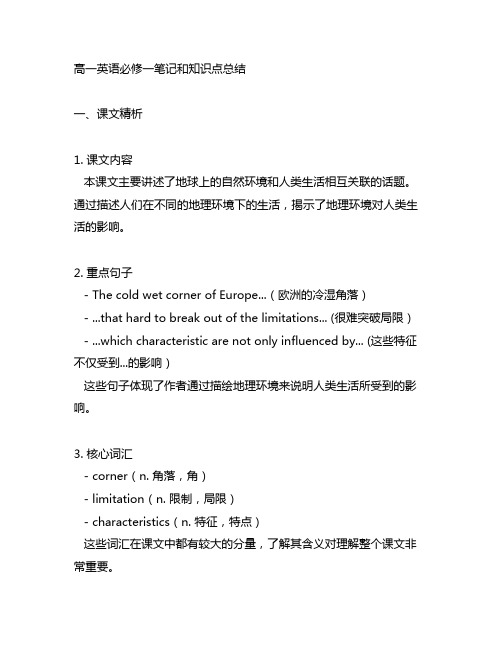
高一英语必修一笔记和知识点总结一、课文精析1. 课文内容本课文主要讲述了地球上的自然环境和人类生活相互关联的话题。
通过描述人们在不同的地理环境下的生活,揭示了地理环境对人类生活的影响。
2. 重点句子- The cold wet corner of Europe...(欧洲的冷湿角落)- ...that hard to break out of the limitations... (很难突破局限) - ...which characteristic are not only influenced by... (这些特征不仅受到...的影响)这些句子体现了作者通过描绘地理环境来说明人类生活所受到的影响。
3. 核心词汇- corner(n. 角落,角)- limitation(n. 限制,局限)- characteristics(n. 特征,特点)这些词汇在课文中都有较大的分量,了解其含义对理解整个课文非常重要。
二、语法重点1. 定语从句本单元的课文中有多处涉及定语从句的使用,如“that hard to break out of the limitations”,“which characteristic are not only influenced by”。
定语从句在句子中修饰名词,起到限定或说明的作用。
2. 被动语态课文中也有多处被动语态的使用,如“The cold wet corner of Europe is inhabited by...”。
被动语态常用于当主语是动作的接受者而不是执行者时。
3. 形容词比较级课文中出现了多处形容词比较级的用法,如“cold wet”,“hard to break out of”。
比较级用于对两者或多者做比较,表示较高、较大或较多。
三、词汇总结1. 当前流行学习法本单元学习了如何通过后缀构词,如“-ful(充满...的)”、“-less(无...的)”,提高对词汇的理解和记忆。
高中生高二英语重点知识点总结_高中英语知识点总结

高中生高二英语重点知识点总结_高中英语知识点总结
一、语法知识点
1. 时态:包括一般现在时、一般过去时、一般将来时、现在进行时、过去进行时、过去将来时、过去完成时等。
2. 从句:包括名词性从句、定语从句、状语从句等。
3. 语态:包括一般现在时语态、一般过去时语态、一般将来时语态等。
4. 并列连词和从属连词的用法。
5. 特殊句型:包括倒装句、感叹句、祈使句等。
二、词汇知识点
1. 单词的词义、拼写和用法。
2. 词性变化:包括形容词、副词、动词、名词的变化和修辞。
三、阅读理解知识点
1. 主旨大意题:判断作者的写作目的和观点。
2. 细节理解题:根据文章提供的具体信息回答相关问题。
3. 推理判断题:根据文章的暗示或推理关系进行判断。
4. 篇章结构题:根据文章的组织结构解答问题。
四、写作知识点
1. 书信写作:包括推荐信、道歉信、邀请信等。
2. 短文写作:包括说明文、议论文、图表作文等。
3. 写作技巧:如选择适当的词语、句子连接等。
五、听力技巧知识点
1. 提醒词语的作用和重要性。
2. 听写前的预测和归纳的技巧。
3. 根据语境推测单词的意思。
六、口语技巧知识点
1. 听力练习:如通过听力材料提高听力水平。
2. 口头表达:如描述图片、演讲等。
七、文化知识点
1. 英美文化:如英美节日、英美习俗等。
2. 国际交往礼仪。
(完整版)高中英语知识点全面总结整理版
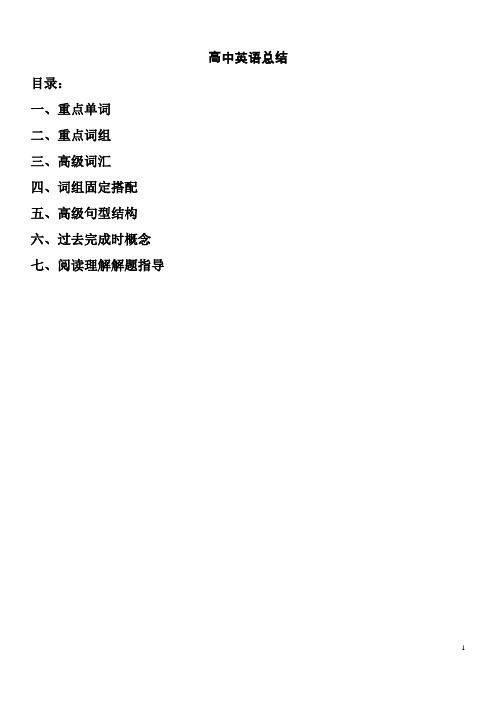
高中英语总结目录:一、重点单词二、重点词组三、高级词汇四、词组固定搭配五、高级句型结构六、过去完成时概念七、阅读理解解题指导一、重点单词1.able 用法:be able to doNote: 反义词unable表示不能,而disabled表示残疾的。
be able to do可以表示经过艰难困苦才能做到的事。
2.abroad 用法:表示到(在)国外,是一个副词,前面不加介词。
Note: 可以说from abroad, 表示从国外回来。
3.admit 用法:表示承认的时候后面要加上动名词形式。
Note: 表示允许进入的时候与介词to搭配。
4.advise 用法:advise sb. to do; advise doingNote: 后面的宾语从句要用虚拟语气。
即:advise that sb. (should) do的形式。
5.afford 用法:通常与动词不定式搭配使用。
Note: 前面需要有be able to或can等词。
6.after 用法:表示在时间、空间之后;be after表示追寻。
Note: 用在将来时的时候后面接一时间点,而in接一个时间段,如:after 3 o’clock; in 3 days.7.agree 用法:与介词on, to, with及动词不定式搭配。
Note: agree on表示达成一致;agree to表示批准;agree with表示同意某人说的话。
8.alive 用法:表语性形容词,在句中只能作表语,不能作定语。
Note: 可以作状语使用,表示活活地,如:bury sb. alive.9.allow 用法:allow doing; allow sb. to doNote: 可以表示允许进入,如:Please allow me in.10.among 用法:用在三者或三者以上的群体中。
Note: 还可以表示其中之一,如:He is among the best.11.and 用法:用于连接两个词、短语、句子或其他相同结构。
高中英语的知识重点归纳
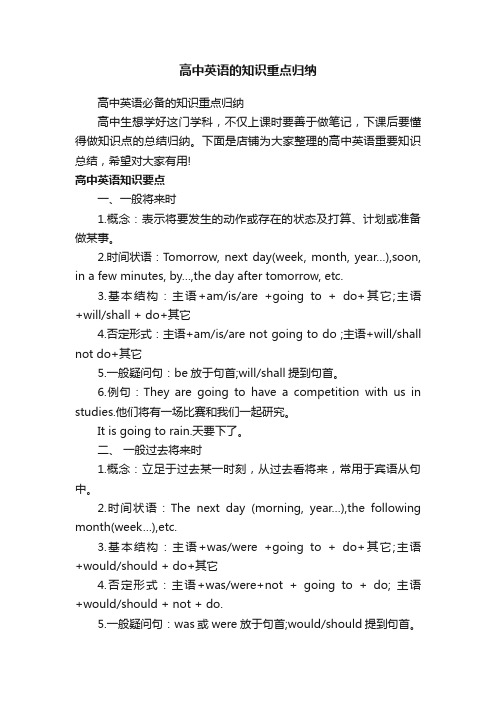
高中英语的知识重点归纳高中英语必备的知识重点归纳高中生想学好这门学科,不仅上课时要善于做笔记,下课后要懂得做知识点的总结归纳。
下面是店铺为大家整理的高中英语重要知识总结,希望对大家有用!高中英语知识要点一、一般将来时1.概念:表示将要发生的动作或存在的状态及打算、计划或准备做某事。
2.时间状语:T omorrow, next day(week, month, year…),soon, in a few minutes, by…,the day after tomorrow, etc.3.基本结构:主语+am/is/are +going to + do+其它;主语+will/shall + do+其它4.否定形式:主语+am/is/are not going to do ;主语+will/shall not do+其它5.一般疑问句:be放于句首;will/shall提到句首。
6.例句:They are going to have a competition with us in studies.他们将有一场比赛和我们一起研究。
It is going to rain.天要下了。
二、一般过去将来时1.概念:立足于过去某一时刻,从过去看将来,常用于宾语从句中。
2.时间状语:The next day (morning, year…),the following month(week…),etc.3.基本结构:主语+was/were +going to + do+其它;主语+would/should + do+其它4.否定形式:主语+was/were+not + going to + do; 主语+would/should + not + do.5.一般疑问句:was或were放于句首;would/should 提到句首。
6.例句:He said he would go to Beijing the next day.他说他第二天要去北京。
高中英语重点知识笔记
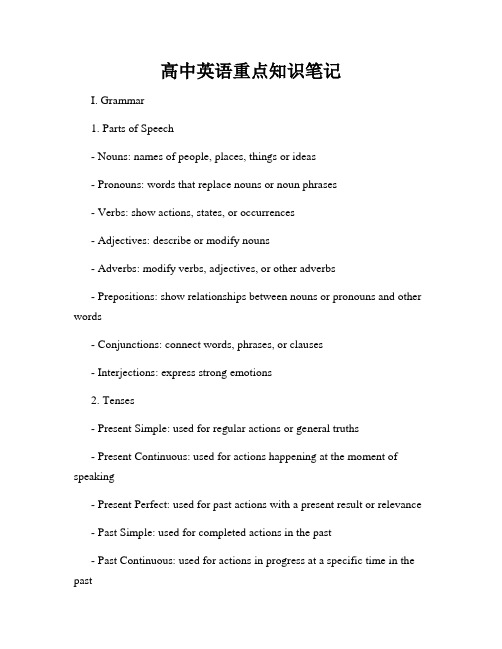
高中英语重点知识笔记I. Grammar1. Parts of Speech- Nouns: names of people, places, things or ideas- Pronouns: words that replace nouns or noun phrases- Verbs: show actions, states, or occurrences- Adjectives: describe or modify nouns- Adverbs: modify verbs, adjectives, or other adverbs- Prepositions: show relationships between nouns or pronouns and other words- Conjunctions: connect words, phrases, or clauses- Interjections: express strong emotions2. Tenses- Present Simple: used for regular actions or general truths- Present Continuous: used for actions happening at the moment of speaking- Present Perfect: used for past actions with a present result or relevance- Past Simple: used for completed actions in the past- Past Continuous: used for actions in progress at a specific time in the past- Past Perfect: used for actions completed before a specific time in the past- Future Simple: used for actions that will happen in the future- Future Continuous: used for ongoing actions in the future- Future Perfect: used for actions that will be completed before a specified time in the future3. Sentence Structure- Subject: who or what the sentence is about- Verb: expresses an action or state of being- Object: receives the action of the verb- Adjective Phrase: modifies nouns or pronouns- Adverb Phrase: modifies verbs, adjectives, or other adverbs- Conditional Sentences: express conditions and their results- Passive Voice: the subject receives the action of the verb- Reported Speech: reporting someone's words or thoughtsII. Vocabulary1. Synonyms and Antonyms- Synonyms: words with similar meanings- Antonyms: words with opposite meanings- Contextual Meaning: understanding words based on the surrounding text2. Word Formation- Prefixes: added at the beginning of a word to change its meaning- Suffixes: added at the end of a word to change its meaning or part of speech- Compound Words: formed by combining two or more words3. Collocations- Words that commonly go together due to natural language usage- Adjective + Noun: e.g., fast food, cold weather- Verb + Noun: e.g., make a decision, take a shower- Verb + Adverb: e.g., run quickly, speak fluentlyIII. Reading Comprehension1. Skimming and Scanning- Skimming: quickly reading to get a general idea of the text- Scanning: searching for specific information by reading quickly2. Understanding Context Clues- Using surrounding words or phrases to determine the meaning of unfamiliar words3. Identifying Main Ideas and Supporting Details- Recognizing the central theme or topic of a text- Locating details that provide evidence or examples for the main ideasIV. Writing Skills1. Essay Writing- Introduction: provides background information and thesis statement- Body Paragraphs: present arguments or evidence supporting the thesis- Conclusion: summarizes the main points and restates the thesis2. Paragraph Structure- Topic Sentence: introduces the main idea or topic of the paragraph- Supporting Sentences: provide details, examples, or explanations- Concluding Sentence: wraps up the paragraph and transitions to the next3. Narrative Writing- Use of vivid descriptions, dialogue, and sequencing to tell a story4. Argumentative Writing- Presenting a claim and providing evidence to support it- Addressing counterarguments and refuting themV. Listening and Speaking1. Active Listening- Paying attention and responding to spoken information- Using body language and gestures to show engagement2. Speaking Techniques- Using clear pronunciation and appropriate intonation- Expressing opinions, giving presentations, and participating in discussions3. Note-taking- Writing down important points while listening- Using abbreviations and symbols for faster and efficient note-takingOverall, these key knowledge points in high school English cover grammar, vocabulary, reading comprehension, writing skills, and listening and speaking techniques. Understanding and mastering these areas will significantly improve English proficiency.。
英语高考知识点笔记
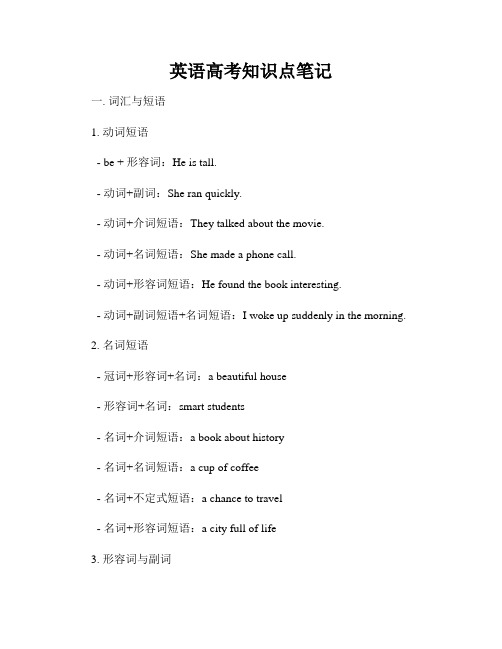
英语高考知识点笔记一. 词汇与短语1. 动词短语- be + 形容词:He is tall.- 动词+副词:She ran quickly.- 动词+介词短语:They talked about the movie.- 动词+名词短语:She made a phone call.- 动词+形容词短语:He found the book interesting.- 动词+副词短语+名词短语:I woke up suddenly in the morning.2. 名词短语- 冠词+形容词+名词:a beautiful house- 形容词+名词:smart students- 名词+介词短语:a book about history- 名词+名词短语:a cup of coffee- 名词+不定式短语:a chance to travel- 名词+形容词短语:a city full of life3. 形容词与副词- 形容词:beautiful, intelligent, kind- 副词:quickly, carefully, loudly4. 介词短语- at home, in the park, on the table, under the tree二. 语法与句型1. 一般现在时- 表示经常、一般性的行为或状态:I often go to the cinema.- 表示客观事实、真理等:The sun rises in the east.- 表示现阶段的状况:He works at a restaurant.2. 一般过去时- 表示过去某一时间发生的动作:I watched a movie last night.- 表示过去的习惯或状态:She used to live in New York.3. 现在进行时- 表示现阶段正在进行的动作:I am studying for the exam.- 表示计划或安排的未来事件:They are traveling to Europe next week.4. 现在完成时- 表示过去发生的动作对现在造成的影响:She has finished her homework.- 表示过去某一时刻已经完成的动作:I have lived in this city since 2010.5. 将来时- 表示将来某一时刻会发生的动作:I will visit my grandparents tomorrow.- 表示根据计划或安排将要发生的动作:We are going to have a party next week.三. 阅读理解技巧1. 寻找关键词- 阅读时注意关键词,帮助理解文章内容。
高中英语知识归纳笔记

高中英语知识归纳一.重点短语1.face the music 面对命运对你的不公平2.absorb…into 吸收,理解接受,吞并be absorbed in全神贯注于, 专心致志于be lost in thought想得出神沉思于…be engaged in 从事于…忙于be concentrated on 集中注意力…3.make a suggestiongive an advicemake the investigation4.look into 调查看浏览5.slow down 减缓6.relate to 有关涉及7.link to 有关联系8.die out 灭绝;die of 死于;die from死于9.his career came to an end. 他的事业结束了。
10.develop a severe illness 染上很严重的疾病高中英语知识要点1. on holiday 在度假,在休假中When I was on holiday, I visited my uncle. 我在度假的时候去看望了叔叔。
2. travel agency旅行社=travel bureau3. take off1)脱下(衣服等), 解(除)掉He took off his wet shoes.他脱下了湿鞋子。
2)(飞机)起飞The plane took off on time. It was a smooth take-off.飞机准时起飞。
起飞非常顺利。
3)匆匆离开The six men got into the car and took off for the park.这六个人上了车,匆匆离开去公园。
4. go wrong v. 走错路, 误入岐途, (机器等)发生故障5. in all adv. 总共6. stay away v.外出7. look up 查询(如宾语为代词,则代词放中间)Look up the word in the dictionary.在字典里查单词。
高中英语必背知识点总结归纳
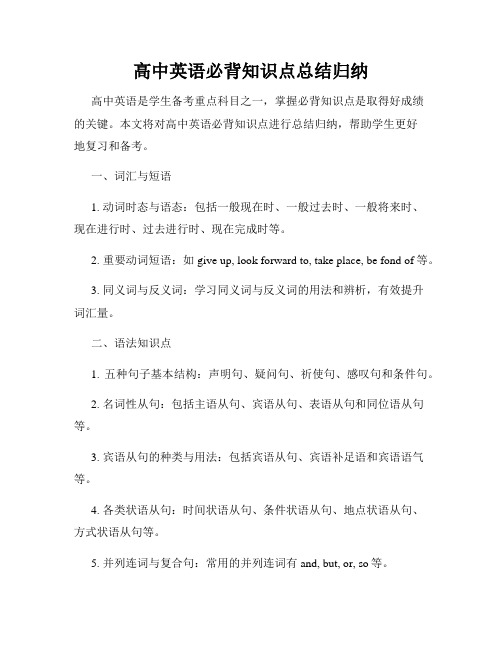
高中英语必背知识点总结归纳高中英语是学生备考重点科目之一,掌握必背知识点是取得好成绩的关键。
本文将对高中英语必背知识点进行总结归纳,帮助学生更好地复习和备考。
一、词汇与短语1. 动词时态与语态:包括一般现在时、一般过去时、一般将来时、现在进行时、过去进行时、现在完成时等。
2. 重要动词短语:如give up, look forward to, take place, be fond of等。
3. 同义词与反义词:学习同义词与反义词的用法和辨析,有效提升词汇量。
二、语法知识点1. 五种句子基本结构:声明句、疑问句、祈使句、感叹句和条件句。
2. 名词性从句:包括主语从句、宾语从句、表语从句和同位语从句等。
3. 宾语从句的种类与用法:包括宾语从句、宾语补足语和宾语语气等。
4. 各类状语从句:时间状语从句、条件状语从句、地点状语从句、方式状语从句等。
5. 并列连词与复合句:常用的并列连词有and, but, or, so等。
6. 特殊句型:倒装句、强调句、感叹句等。
三、阅读理解技巧1. 找出主题句与支持细节:通读全文,抓住文章的主题句与重要支持细节,帮助理解文章主旨。
2. 推理与判断:通过上下文推理出词义、句义或作者意图,提高阅读理解能力。
3. 理解文体与修辞手法:了解不同文体的特点以及修辞手法的使用,帮助正确解答问题。
4. 阅读速度与细节把握:培养快速阅读的技巧,同时注意细节把握,避免漏读或误读。
四、写作技巧与范文模板1. 书信写作:包括个人信函、申请信、投诉信等。
应掌握书信的格式、礼貌用语和写作技巧。
2. 短文写作:常见的短文类型包括记叙文、说明文、议论文等。
理解各种短文写作要求,掌握范文模板和写作技巧。
3. 写作注意事项:书写清晰、逻辑清楚、用词准确、语法正确。
注意段落结构、句子多样性和过渡词的使用。
五、口语交际技巧1. 日常交际用语:包括问候、感谢、道歉、邀请等基本交际用语。
2. 语音语调和语速:正确发音、抑扬顿挫和语速适中,提高口语表达的流利度。
高中英语知识点总结归纳

高中英语知识点总结归纳一、语法知识点1. 时态- 一般现在时- 用法:表示经常发生的动作、存在的状态或客观事实、真理等。
例如:The earth moves around the sun.(客观真理)He often goes to school by bike.(经常发生的动作)- 结构:主语 + 动词原形(第三人称单数形式为动词 + s / es)。
例如:I play football every day. She studies hard.- 一般过去时- 用法:表示过去某个时间发生的动作或存在的状态。
例如:I saw him yesterday.- 结构:主语 + 动词的过去式。
规则动词的过去式变化有一定规律,如直接加 -ed(work - worked),以e结尾加 -d(live - lived)等;不规则动词需要单独记忆(如go - went,see - saw)。
- 一般将来时- 用法:表示将来某个时间要发生的动作或存在的状态。
例如:I will go to Beijing next week.- 结构:will + 动词原形或be going to + 动词原形。
be going to结构更强调计划、打算。
例如:He is going to study abroad.- 现在进行时- 用法:表示此时此刻正在进行的动作,也可表示现阶段正在进行的动作。
例如:Look! She is dancing.(此时此刻)He is writing a book these days.(现阶段)- 结构:主语 + be动词(am/is/are)+ 动词的 -ing形式。
- 过去进行时- 用法:表示过去某个时刻或某段时间正在进行的动作。
例如:At that time, I was reading a book.- 结构:主语 + was / were + 动词的 -ing形式。
- 现在完成时- 用法:表示过去发生的动作对现在造成的影响或结果,或表示从过去开始一直持续到现在的动作或状态。
高三手抄英语笔记知识点

高三手抄英语笔记知识点一、语法知识点1. 时态:- 一般现在时:用于陈述事实、普遍真理、经常重复的动作等。
- 过去时:表示过去发生的动作或状态,常与表示过去的时间状语连用。
- 未来时:表示将来某个时间将要发生的动作或事件。
2. 从句:- 定语从句:用来修饰名词或代词,起到进一步限定或解释的作用。
- 名词性从句:作为主语、宾语、表语或同位语,起到名词的作用。
- 状语从句:用来表示时间、原因、条件、目的等,起到状语的作用。
3. 词性和词形转换:- 名词:表示人、物、地点等具体事物。
- 形容词:用来描述名词的性质、特征等。
- 副词:修饰动词、形容词或其他副词,表示程度、方式等。
- 动词:表示动作或状态的词语。
二、阅读技巧1. 快速阅读:了解文章大意,把握文章的结构和主题。
2. 略读:找出关键信息,了解文章的主旨和要点。
3. 细读:仔细阅读,理解每个句子和段落的含义。
4. 解题技巧:学会根据题目要求定位信息,理解题干和选项的意思。
三、写作技巧1. 增加词汇量:多积累常用的词汇和短语,灵活运用表达思想。
2. 提高语法水平:理解句子结构,准确使用各种语法知识。
3. 改善句子结构:注意句子的平衡和连贯性,避免重复和冗长。
4. 多练习写作:尝试不同类型的写作题目,提升写作能力和篇章组织结构。
四、听力技巧1. 提前预测:在听力开始前仔细阅读题目,思考可能出现的答案。
2. 注意听力材料的主题和目的,抓住关键词和信息。
3. 注意时间分配,不要在一道题目上花费过多时间。
4. 多做听力练习,提高听力的速度和准确性。
五、口语技巧1. 提前准备:在进行口语表达前,充分思考自己要表达的内容和观点。
2. 提高流利度:注意语速和语调,多训练口语连贯性。
3. 注意表达准确性:使用准确的词汇和语法,避免语法错误和发音不清楚。
4. 多参与口语练习,积极与他人交流和讨论。
六、写作常用表达1. 引言段常用句式:- It is universally acknowledged that...- There is no denying that... - It goes without saying that... - As is known to all...2. 表达观点的句式:- From my point of view...- In my opinion/view...- Personally, I believe that... - As far as I'm concerned...3. 举例句式:- For example...- Take...as an example...- As a case in point...- As illustrated by...4. 结尾段常用句式:- In conclusion...- To sum up...- All in all...- In a word...- On the whole...以上就是高三手抄英语笔记的知识点总结,希望对你的学习有所帮助。
高中英语知识点总结
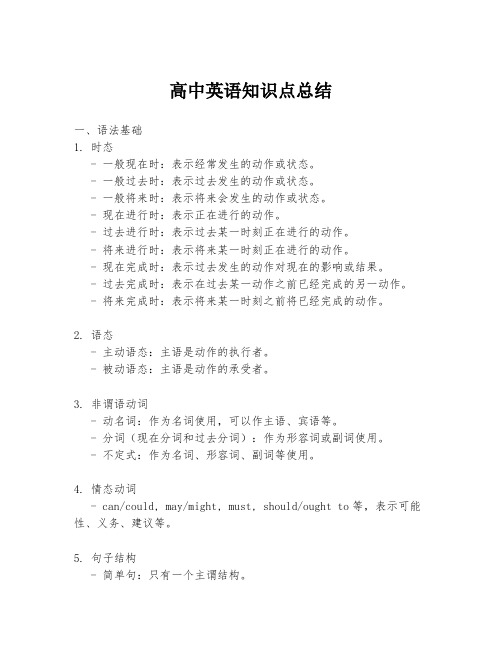
高中英语知识点总结一、语法基础1. 时态- 一般现在时:表示经常发生的动作或状态。
- 一般过去时:表示过去发生的动作或状态。
- 一般将来时:表示将来会发生的动作或状态。
- 现在进行时:表示正在进行的动作。
- 过去进行时:表示过去某一时刻正在进行的动作。
- 将来进行时:表示将来某一时刻正在进行的动作。
- 现在完成时:表示过去发生的动作对现在的影响或结果。
- 过去完成时:表示在过去某一动作之前已经完成的另一动作。
- 将来完成时:表示将来某一时刻之前将已经完成的动作。
2. 语态- 主动语态:主语是动作的执行者。
- 被动语态:主语是动作的承受者。
3. 非谓语动词- 动名词:作为名词使用,可以作主语、宾语等。
- 分词(现在分词和过去分词):作为形容词或副词使用。
- 不定式:作为名词、形容词、副词等使用。
4. 情态动词- can/could, may/might, must, should/ought to等,表示可能性、义务、建议等。
5. 句子结构- 简单句:只有一个主谓结构。
- 并列句:由两个或多个简单句通过并列连词连接。
- 复合句:包含一个主句和至少一个从句。
- 复杂句:包含一个主句和多个从句,至少有一个从句是嵌套的。
二、词汇与短语1. 基础词汇- 常用名词、动词、形容词、副词、代词等。
- 同义词、反义词、短语动词等。
2. 词组和习语- 常见短语动词:look after, take care of, give up等。
- 习语和俚语:break the ice, bite the bullet, hit the sack 等。
三、阅读理解1. 阅读技巧- 略读(skimming):快速获取文章大意。
- 扫读(scanning):寻找具体信息。
- 精读(intensive reading):深入理解文章内容。
2. 文章类型- 记叙文、议论文、说明文、应用文等。
3. 阅读理解策略- 预测:根据上下文预测内容。
高中英语学霸笔记(高一上、高二下)
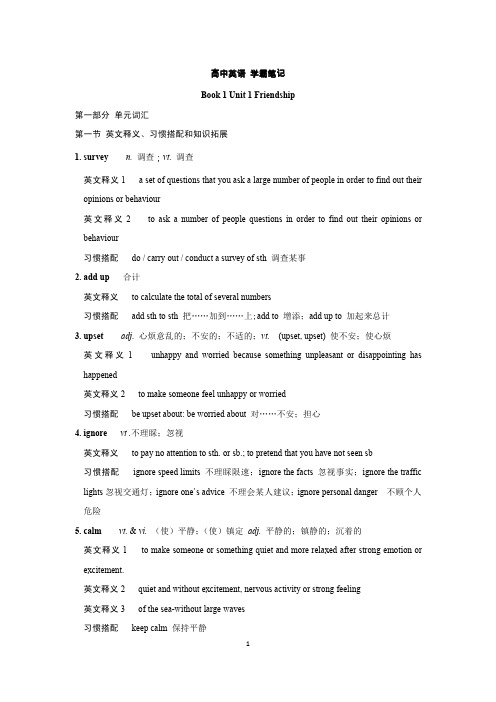
高中英语学霸笔记Book1Unit1Friendship第一部分单元词汇第一节英文释义、习惯搭配和知识拓展1.survey n.调查;vt.调查英文释义1a set of questions that you ask a large number of people in order to find out their opinions or behaviour英文释义2to ask a number of people questions in order to find out their opinions or behaviour习惯搭配do/carry out/conduct a survey of sth调查某事2.add up合计英文释义to calculate the total of several numbers习惯搭配add sth to sth把……加到……上;add to增添;add up to加起来总计3.upset adj.心烦意乱的;不安的;不适的;vt.(upset,upset)使不安;使心烦英文释义1unhappy and worried because something unpleasant or disappointing has happened英文释义2to make someone feel unhappy or worried习惯搭配be upset about:be worried about对……不安;担心4.ignore vt.不理睬;忽视英文释义to pay no attention to sth.or sb.;to pretend that you have not seen sb习惯搭配ignore speed limits不理睬限速;ignore the facts忽视事实;ignore the traffic lights忽视交通灯;ignore one`s advice不理会某人建议;ignore personal danger不顾个人危险5.calm vt.&vi.(使)平静;(使)镇定adj.平静的;镇静的;沉着的英文释义1to make someone or something quiet and more relaxed after strong emotion or excitement.英文释义2quiet and without excitement,nervous activity or strong feeling英文释义3of the sea-without large waves习惯搭配keep calm保持平静6.have got to do sth不得不;必须英文释义have to do sth7.concern vt.(使)担忧;涉及;关系到n.担心;关注;(利害)关系英文释义1to make someone feel worried or upset英文释义2to involve sb;be about英文释义3worry,anxiety especially about something such as a social problem,someone`s health习惯搭配be concerned with和……有关系;as far as I am concerned就我个人而言;express one`s concern about表达对某事的关注8.walk the dog遛狗英文释义to take a dog for a walk9.loose adj.松的;松开的英文释义not firmly fixed in place;not tied;not tight习惯搭配a loose dress宽松的裙子10.vet n.兽医英文释义someone who is trained to give medical care and treatment to sick animals 11.go through经历;经受;浏览;检查;穿过;完成;通过英文释义1to suffer or experience something bad习惯搭配1go through the war经历战争;go through the hard time经历艰难时期英文释义2to read something from beginning to end习惯搭配2go through the papers浏览报纸英文释义3examine thoroughly;check习惯搭配3go through my luggage at the customs海关检查行李英文释义4pass through;pass习惯搭配4go through the forest穿过森林英文释义5complete习惯搭配5go through the operation完成手术英文释义6be passed12.German adj.德国的;德国人的;德语的n.德国人;德语英文释义1relating to Germany,its people,or its language英文释义2a person comes from Germany英文释义3the language used in Germany,Austria and parts of Switzerland习惯搭配a German teacher一位德语老师,一名德国的老师;a German farm一座德国农场;two Germans两个德国人;speak German讲德语13.set down记下;放下;登记英文释义1write down;put down习惯搭配1set down your thoughts or experiences英文释义2put down;lay down习惯搭配set down the pen放下钢笔;set the table:lay the table摆放桌子14.a series of一连串的;一系列;一套英文释义a group of events or actions of a similar type that happen one after another习惯搭配a series of car accidents一连串汽车事故;a series of pictures一系列的画;a new TV play series电视连续剧15.outdoors adv.在户外;在野外英文释义not inside a building;indoors:in a building习惯搭配go outdoors for a walk去户外散步知识拓展outdoor activities室内活动;an indoor swimming pool一个室内游泳池16.spellbind vt.(spellbound-spellbound)迷住;迷惑英文释义to cause to be spellbound习惯搭配keep sb spellbound:keep sb attracted吸引某人;be spellbound被诱惑17.on purpose故意英文释义deliberately18.in order to为了……英文释义so as to习惯搭配in order not to do sth为了不……知识拓展in order that:so that为了……(引导状语从句)19.at dusk在黄昏时刻英文释义towards evening20.thunder n.雷;雷声;vi.打雷;雷鸣英文释义1loud noise that you hear during a storm,usually after a flash of lightning 习惯搭配thunder and lightning雷电英文释义2to make a very loud deep noise21.entire adj.整个的;完全的;全部的;entirely adv.完全地;全然地;整个地英文释义1whole;total习惯搭配1his entire life他整个的一生英文释义2completely习惯搭配2entirely agree with sb完全同意某人意见22.power n.能力;力量;权力英文释义1the ability or right to control people or events英文释义2energy that can be used to make a machine work or to make electricity 英文释义3political control of a country or an area.习惯搭配1horse power马力;wind power风力;the power station电站习惯搭配2Knowledge is power知识就是力量习惯搭配3be in power上台;come to power掌权23.face to fac e面对面地;face-to-face面对面的英文释义very close and in front of each other习惯搭配1stand face to face面对面站着习惯搭配2have a face-to-face talk面对面的会谈24.curtain n.窗帘;门帘;幕布英文释义1a piece of cloth that is hung to cover a window英文释义2a piece of thick,heavy cloth that hangs in front of the stage in a theatre 习惯搭配draw the curtains拉窗帘;close the curtains合窗帘25.dusty adj.积满灰尘的英文释义covered with dust习惯搭配clean the dusty table打扫有灰尘的桌子26.no longer/not...any longer不再……27.partner n.伙伴;合作者;合伙人英文释义one of the people who are married,or who live;one of the owners of a business;a country that your country has an agreement with习惯搭配my tennis partner我的网球搭档28.settle vi.安家;定居;停留;vt.使定居;安排;解决英文释义1to go to live in a new place and stay there习惯搭配1settle in China定居中国;settle down安家;定居英文释义2put oneself in a comfortable position习惯搭配2settle himself on a sofa在沙发上安顿好英文释义3solve vt.解决习惯搭配3settle the difference解决分歧;settle the argument解决争执;settle a problem 解决问题英文释义4to become calm or relaxed习惯搭配4breathe to settle his nerves呼吸来平静自己的情绪29.suffer vt.&vi.遭受;忍受;经历(suffered-suffered)英文释义1to be badly affected by a disease,pain,sadness or a lack of something英文释义2experience习惯搭配suffer from a bad headache遭受头疼;suffer from a flood遭受洪水;suffer from pollution遭受污染习惯搭配suffer a defeat遭受失败;suffer a heart attack遭受心脏病;suffer a great loss遭受损失;suffer damage遭受破坏;suffer hunger遭受饥饿;suffer punishment遭受处罚;suffer pain遭受疼痛30.loneliness n.孤单;寂寞英文释义the state of being lonely习惯搭配have a fear of loneliness害怕孤独31.high way n.公路;大路英文释义main road习惯搭配highway在公路上;on the freeway在高速路上32.recover vi.&vt.痊愈;恢复;重新获得英文释义1to get well after an illness or an accident习惯搭配1recover from the operation手术后恢复;recover his strength恢复力气英文释义2to get back or find something that was lost,missing or stolen习惯搭配2recover the lost paintings找回丢失的油画33.get/be tired of对……厌烦英文释义be fed up with习惯搭配1be tired of doing sth厌倦做某事知识拓展be tired from/with由于……疲劳习惯搭配2be tired from/with too much homework由于太多功课而疲劳34.pack vi.&vt.捆扎;包装;打行李英文释义to put things into cases or boxes习惯搭配pack my clothes把我的衣服打包;pack her suitcase箱子里装她的东西35.suitcase n.手提箱;衣箱英文释义a case with a handle used for carrying clothes习惯搭配unpack his suitcase打开他的衣箱36.overcoat n.大衣;外套英文释义a thick warm coat that you wear in winter习惯搭配put his overcoat on the chair把他的大衣放在椅子上37.teenager n.十几岁的青少年英文释义a teen;a person who is between13and19years old习惯搭配the missing teenager失踪的青少年38.get along(well)with sb与……相处;进展英文释义1to have a friendly relationship习惯搭配1get along/on well with sb和某人相处好英文释义2to progress in something that you are doing习惯搭配2get along well with the work工作进展顺利39.gossip vi.&n.闲话;闲谈(gossiped-gossiped)英文释义to spend time talking to someone about other people`s behavior or private life 习惯搭配gossip about sth with sb和某人说闲话40.fall in love with相爱;爱上英文释义to begin to experience feelings of love习惯搭配be in love with相爱;爱上(状态)41.exactly adv.确实如此;正是;确切地英文释义used to emphasize that something is completely correct42.disagree vi.不同意英文释义to have a different opinion from someone else习惯搭配disagree with不同意;disagree about不同意43.grateful adj.感激的;表示谢意的英文释义showing thanks because someone has done something kind习惯搭配be grateful to sb for sth因为某事而感激某人44.dislike n.&vt.不喜欢;厌恶英文释义1to not like sb or sth.习惯搭配1dislike to do sth不喜欢做某事;dislike doing sth不喜欢做某事英文释义2dislike:n.a thing that you don`t like;not liking sb or sth习惯搭配my likes and dislikes我喜好和厌恶的事情45.join in sth参加;加入英文释义participate in sth.;take part in sth together;become involved in sth习惯搭配join sb in the activity和某人一起参加活动;join the math club加入数学俱乐部; join the basketball team加入棒球队;join the army参军46.tip n.忠告;提示;窍门、技巧。
高中英语重点笔记大全

高中英语重点笔记大全高中英语的学习对于很多同学来说都是一项具有挑战性的任务,但只要掌握了重点知识,就能事半功倍。
以下是为大家整理的高中英语重点笔记,希望能对大家的学习有所帮助。
一、词汇1、词汇量的积累词汇是英语学习的基础,建议同学们每天背诵一定量的单词,可以通过单词书、手机APP 等方式进行。
同时,要注意单词的发音、拼写、词义和用法。
2、重点词汇(1)动词:如 break、come、get、go、make、put、take 等常见动词的多种用法。
(2)形容词:如 good、bad、beautiful、important 等形容词的比较级和最高级形式及用法。
(3)名词:如 family、friend、classroom 等名词的复数形式和所有格形式。
3、词汇记忆方法(1)联想记忆法:通过将单词与相关的事物、场景或经历联系起来,帮助记忆。
(2)词根词缀记忆法:了解常见的词根和词缀,有助于推测单词的词义。
(3)语境记忆法:将单词放在句子或文章中记忆,更能理解其用法。
二、语法1、时态和语态(1)一般现在时、一般过去时、一般将来时、现在进行时、过去进行时、现在完成时、过去完成时、将来完成时等时态的构成和用法。
(2)主动语态和被动语态的转换和使用。
2、句子成分(1)主语、谓语、宾语、定语、状语、补语等成分的概念和作用。
(2)能够正确分析句子的成分,有助于理解句子结构和意思。
3、从句(1)定语从句:关系代词(that、which、who、whom、whose)和关系副词(when、where、why)的用法。
(2)宾语从句:注意宾语从句的语序和时态。
(3)状语从句:时间状语从句(when、while、as、before、after 等)、条件状语从句(if、unless 等)、原因状语从句(because、since、as 等)等的用法。
4、虚拟语气(1)if 引导的虚拟条件句的三种情况(与现在事实相反、与过去事实相反、与将来事实相反)。
高一英语重点知识归纳笔记
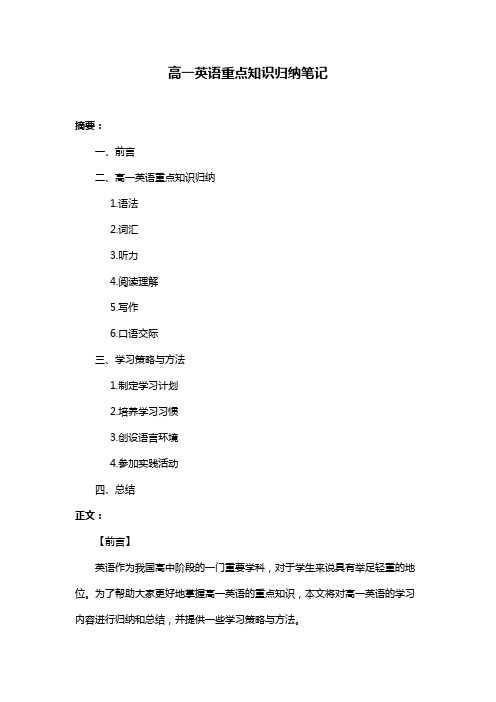
高一英语重点知识归纳笔记摘要:一、前言二、高一英语重点知识归纳1.语法2.词汇3.听力4.阅读理解5.写作6.口语交际三、学习策略与方法1.制定学习计划2.培养学习习惯3.创设语言环境4.参加实践活动四、总结正文:【前言】英语作为我国高中阶段的一门重要学科,对于学生来说具有举足轻重的地位。
为了帮助大家更好地掌握高一英语的重点知识,本文将对高一英语的学习内容进行归纳和总结,并提供一些学习策略与方法。
【高一英语重点知识归纳】1.语法高一英语语法主要包括时态、语态、情态动词、非谓语动词等内容。
学生需要掌握各种语法规则,并在实际语境中灵活运用。
2.词汇词汇是英语学习的基础,学生应掌握常用词汇,特别是动词、名词、形容词和副词。
此外,还应注意学习词组、短语和固定搭配。
3.听力提高英语听力水平需要大量的实践。
学生可以借助教材、听力材料和在线资源进行练习,同时注意培养听力技巧,如预测、推断和捕捉关键信息。
4.阅读理解阅读理解要求学生具备较强的词汇、语法和理解能力。
学生应学会从文章中获取信息,进行推理和判断,同时掌握阅读策略,如扫描、略读和详读。
5.写作写作包括书面表达和口头表达。
学生需要掌握一定的写作技巧,如如何组织段落、使用连词和过渡句等。
此外,还应注意语言的准确性、多样性和连贯性。
6.口语交际口语交际要求学生具备较强的发音、语调和语速控制能力。
学生应多参与课堂讨论、角色扮演等实践活动,提高口头表达能力。
【学习策略与方法】1.制定学习计划学生应根据自身情况制定合理的学习计划,确保每个阶段的学习目标都清晰明确。
2.培养学习习惯良好的学习习惯有助于提高学习效率。
学生应养成每天预习、复习课文、积累词汇和练习听力的习惯。
3.创设语言环境学生可以通过观看英语电影、参加英语角、与外国朋友交流等方式,提高自己的英语实际运用能力。
4.参加实践活动学生可以参加英语演讲比赛、写作比赛等活动,锻炼自己的英语能力,同时增加学习的趣味性。
高中英语知识点总结归纳

高中英语知识点总结归纳一、词汇与语法1. 词汇积累- 常用词汇:掌握高频词汇,包括日常生活、学习、工作等相关词汇。
- 词性变化:了解名词、动词、形容词、副词等词性的构成和变化规则。
- 词组搭配:学习固定搭配和短语动词,理解其意义和用法。
2. 语法结构- 时态:掌握一般现在时、一般过去时、现在进行时、过去进行时、一般将来时、现在完成时等基本时态及其用法。
- 语态:了解主动语态和被动语态的构成及其转换方法。
- 非谓语动词:学习动名词、分词(现在分词和过去分词)和不定式的用法。
- 句子结构:理解简单句、并列句和复合句(包括定语从句、状语从句、宾语从句等)的结构和用法。
- 虚拟语气:掌握与现在事实相反的虚拟条件句、与过去事实相反的虚拟条件句以及表示建议、要求等的虚拟语气。
二、阅读理解1. 快速阅读- 培养快速浏览文章,抓住主旨大意的能力。
- 学会通过上下文线索推断生词含义。
2. 深度理解- 分析文章结构,理解段落大意和文章中心思想。
- 识别作者的观点、态度和写作目的。
3. 推理判断- 根据文章内容进行逻辑推理,判断信息的真伪。
- 理解隐含意义,包括比喻、象征等修辞手法。
三、写作技巧1. 句子构建- 学会使用复杂句型,包括使用从句和非谓语动词结构。
- 注意句子的连贯性,使用合适的连接词。
2. 段落发展- 掌握段落的基本结构:主题句、支持句和结论句。
- 使用例证、比较、对比、因果等方法展开段落。
3. 文章类型- 学会写作不同类型的文章,如叙述文、议论文、说明文和应用文。
- 注意文章的组织结构,包括引言、正文和结尾。
四、听力与口语1. 听力技巧- 培养良好的听力习惯,如预测、归纳和猜测。
- 提高对不同口音、语速和语调的理解能力。
2. 口语表达- 增强语言的流利性和准确性。
- 学会使用恰当的语调和停顿,提高口语交际能力。
3. 情景对话- 掌握日常交流中的基本句型和表达方式。
- 能够在特定情景下进行有效的沟通和交流。
高中英语语法归纳总结笔记简单

高中英语语法归纳总结笔记简单高中英语语法归纳总结笔记是学习英语必备的重要工具。
语法是语言的骨架,掌握好语法规则对提高语言运用能力和表达准确性至关重要。
下面将对高中英语语法的常见知识点进行归纳总结,以便帮助大家更好地掌握。
一、基本句型1. 主语 + 动词主语为句子的中心组成部分,动词表示主语的动作或状态。
例句:Mary sings beautifully.2. 主语 + 动词 + 宾语宾语是指动作的承受者或影响者,可以是名词、代词、动名词或不定式等。
例句:Tom likes apples.3. 主语 + 动词 + 宾语 + 宾补宾补用来补充说明或进一步修饰宾语。
例句:We elected him chairman.4. 主语 + 动词 + 间接宾语 + 直接宾语间接宾语表示动作的得益者,而直接宾语则表示动作的直接对象。
例句:They sent me a gift.二、时态和语态1. 一般现在时一般现在时用来表示经常性的动作或现在的真理。
例句:The sun rises in the east.2. 一般过去时一般过去时用来表示过去发生的动作或状态。
例句:They went to the park yesterday.3. 一般将来时一般将来时用来表示将来要发生的动作或状态。
例句:We will go shopping tomorrow.4. 现在进行时现在进行时用来表示现在正在发生的动作。
例句:I am studying for the exam.5. 过去进行时过去进行时用来表示过去某一时刻正在进行的动作。
例句:He was playing basketball when I saw him.6. 被动语态被动语态表示动作的承受者在句子中的主语位置。
例句:The book was written by him.三、从句从句是指在一个主句中包含其他句子形式的从句,主要有名词性从句、定语从句和副词从句。
高二英语重点知识笔记

高二英语重点知识笔记1. 时态:一般现在时、一般过去时、一般将来时、现在进行时、过去进行时、将来进行时、现在完成时、过去完成时和将来完成时的用法。
- 一般现在时:表示经常性的动作或状态,如:I play football every weekend.(我每个周末都踢足球。
)- 一般过去时:表示过去发生的动作或状态,如:She watched a movie last night.(她昨晚看了一部电影。
)- 一般将来时:表示将来要发生的动作或状态,如:We will go to the beach tomorrow.(我们明天要去海滩。
)- 现在进行时:表示现在正在进行的动作,如:They are studying for their exams.(他们正在为考试而学习。
)- 过去进行时:表示过去某一时刻正在进行的动作,如:I was reading a book when he called me.(他给我打电话的时候,我正在看书。
)- 将来进行时:表示将来某一时刻正在进行的动作,如:At this time tomorrow, we will be having dinner.(明天这个时候,我们将在吃晚餐。
)- 现在完成时:表示过去发生的动作对现在造成的影响或结果,如:She has finished her homework.(她已经完成了她的作业。
)- 过去完成时:表示在过去某一时间之前已经发生的动作,如:By the time I arrived, they had already left.(当我到达的时候,他们已经离开了。
)- 将来完成时:表示将来某一时间之前将要完成的动作,如:By next year, he will have graduated from high school.(到明年,他将已经从高中毕业了。
)2. 被动语态:理解被动语态的概念,学会使用被动语态的句子结构,并能正确运用被动语态。
高中英语单词重点笔记归纳
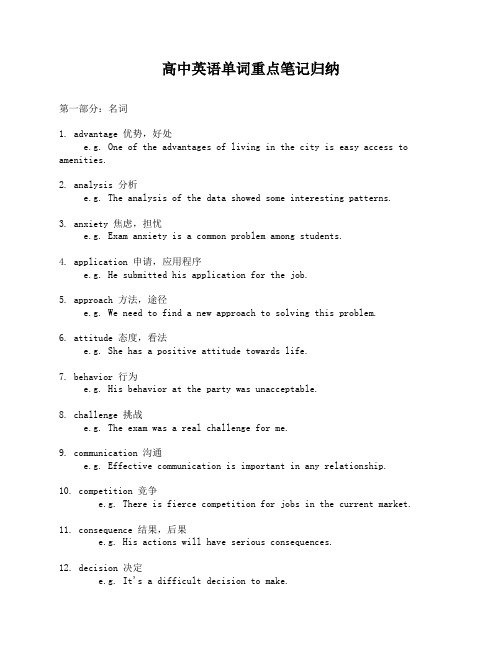
高中英语单词重点笔记归纳第一部分:名词1. advantage 优势,好处e.g. One of the advantages of living in the city is easy access to amenities.2. analysis 分析e.g. The analysis of the data showed some interesting patterns.3. anxiety 焦虑,担忧e.g. Exam anxiety is a common problem among students.4. application 申请,应用程序e.g. He submitted his application for the job.5. approach 方法,途径e.g. We need to find a new approach to solving this problem.6. attitude 态度,看法e.g. She has a positive attitude towards life.7. behavior 行为e.g. His behavior at the party was unacceptable.8. challenge 挑战e.g. The exam was a real challenge for me.9. communication 沟通e.g. Effective communication is important in any relationship.10. competition 竞争e.g. There is fierce competition for jobs in the current market.11. consequence 结果,后果e.g. His actions will have serious consequences.12. decision 决定e.g. It's a difficult decision to make.13. definition 定义e.g. Can you give me a clear definition of this word?14. development 发展e.g. The city has seen rapid development in recent years.15. education 教育e.g. Education is the key to success.16. effect 影响e.g. The medicine had a positive effect on her health.17. environment 环境e.g. We need to protect the environment for future generations.18. experience 经验e.g. Traveling is a great way to gain new experiences.19. explanation 解释e.g. Can you give me an explanation for your actions?20. expression 表达e.g. She had a confused expression on her face.第二部分:形容词1. accurate 准确的e.g. His calculations were accurate.2. afraid 害怕的e.g. She was afraid of heights.3. available 可用的e.g. Is there a room available for tonight?4. careful 小心的e.g. Be careful when crossing the street.5. certain 确定的e.g. I'm certain that he will pass the exam.6. confident 自信的e.g. She is confident in her abilities.7. difficult 困难的e.g. The test was very difficult.8. effective 有效的e.g. This medicine is very effective for treating headaches.9. familiar 熟悉的e.g. I am familiar with this neighborhood.10. flexible 灵活的e.g. She has a flexible schedule.11. grateful 感激的e.g. I am grateful for your help.12. honest 诚实的e.g. He is known for being honest.13. important 重要的e.g. It is important to exercise regularly.14. interesting 有趣的e.g. The book was very interesting.15. necessary 必要的e.g. It is necessary to bring your ID to enter the building.16. patient 耐心的e.g. The teacher was patient with her students.17. recent 最近的e.g. The recent events have caused a lot of concern.18. responsible 负责任的e.g. He is a responsible person who always completes his work on time.19. similar 相似的e.g. The two paintings are very similar in style.20. typical 典型的e.g. This is a typical example of the problem.第三部分:动词1. accept 接受e.g. She accepted the job offer.2. achieve 实现e.g. He achieved his goal of running a marathon.3. act 行动e.g. It's time to act and find a solution.4. affect 影响e.g. The rain affected our plans for the day.5. believe 相信e.g. I believe in you.6. choose 选择e.g. Choose your words carefully.7. consider 考虑e.g. We need to consider all options before making a decision.8. develop 发展e.g. He developed a new method for solving the problem.9. discover 发现e.g. She discovered a hidden treasure in the attic.10. encourage 鼓励e.g. Her parents encouraged her to pursue her dreams.11. exist 存在e.g. Does life exist on other planets?12. experience 经历e.g. He experienced many hardships in his life.13. fail 失败e.g. Don't be afraid to fail; it's part of the learning process.14. improve 改善e.g. She worked hard to improve her grades.15. involve 包含e.g. The project will involve a lot of teamwork.16. learn 学习e.g. He is eager to learn new skills.17. perform 表现e.g. She performed brilliantly in the play.18. realize 实现e.g. He finally realized his dream of becoming a pilot.19. succeed 成功e.g. With hard work, you can succeed in anything.20. understand 理解e.g. I don't understand the instructions.第四部分:副词1. actually 实际上e.g. He didn't actually mean what he said.2. always 总是e.g. She always arrives on time.3. clearly 清楚地e.g. He explained his ideas clearly.4. directly 直接地e.g. Please speak directly to me instead of going through someone else.5. easily 容易地e.g. She learned how to swim easily.6. fully 完全地e.g. I fully agree with your decision.7. generally 通常地e.g. Generally, it's better to be prepared for any situation.8. highly 高度地e.g. He is highly respected in his field.9. just 只是e.g. I was just kidding.10. maybe 或许e.g. Maybe we should try a different approach.11. nearly 几乎e.g. She nearly missed her flight.12. particularly 特别地e.g. I particularly enjoy reading books about history.13. recently 最近e.g. I haven't seen him recently.14. simply 简单地e.g. The answer is simply to work harder.15. truly 真正地e.g. She truly believes in the power of love.16. usually 通常e.g. I usually go for a run in the morning.17. well 好e.g. The project is going well so far.18. yet 还,仍然e.g. I haven't finished my homework yet.19. actively 积极地e.g. He actively participates in class discussions.20. justly 公正地e.g. The judge made a justly decision in the case.。
- 1、下载文档前请自行甄别文档内容的完整性,平台不提供额外的编辑、内容补充、找答案等附加服务。
- 2、"仅部分预览"的文档,不可在线预览部分如存在完整性等问题,可反馈申请退款(可完整预览的文档不适用该条件!)。
- 3、如文档侵犯您的权益,请联系客服反馈,我们会尽快为您处理(人工客服工作时间:9:00-18:30)。
高中英语知识归纳笔记高中英语知识归纳一.重点短语1.face the music 面对命运对你的不公平2.absorb…into 吸收,理解接受,吞并be absorbed in全神贯注于, 专心致志于be lost in thought想得出神沉思于…be engaged in 从事于…忙于be concentrated on 集中注意力…3.make a suggestiongive an advicemake the investigation4.look into 调查看浏览5.slow down 减缓6.relate to 有关涉及7.link to 有关联系8.die out 灭绝;die of 死于;die from死于9.his career came to an end. 他的事业结束了。
10.develop a severe illness 染上很严重的疾病高中英语知识要点1. on holiday 在度假,在休假中When I was on holiday, I visited my uncle. 我在度假的时候去看望了叔叔。
2. travel agency旅行社=travel bureau3. take off1)脱下(衣服等), 解(除)掉He took off his wet shoes.他脱下了湿鞋子。
2)(飞机)起飞The plane took off on time. It was a smooth take-off.飞机准时起飞。
起飞非常顺利。
3)匆匆离开The six men got into the car and took off for the park.这六个人上了车,匆匆离开去公园。
4. go wrong v. 走错路, 误入岐途, (机器等)发生故障5. in all adv. 总共6. stay away v.外出7. look up 查询(如宾语为代词,则代词放中间)Look up the word in the dictionary.在字典里查单词。
相关词组:look for 寻找;look after照顾,照料; look forward to期待;look into调查; look on旁观;look out注意;look out for注意,留心,提防;look over翻阅,查看,检查;look around环视;look through翻阅,查看。
8. run after追逐,追求If you run after two hares, you will catch neither.同时追两只兔子,你一只也抓不到。
9. on the air广播We will be on the air in five minutes.我们五分钟以后开始广播。
This programme comes on the air at the same time every day.这个节目每天在同一时间播出。
高中英语语法知识点一、主语主语是句子陈述的对象,说明是谁或什么。
表示句子说的是"什么人"、“什么事”、“什么东西”、“什么地方”等等。
名词、代词、数词、动名词、To do不定式、一个句子都可以做主语。
二、谓语谓语是对主语动作或状态的陈述或说明,指出“做什么”、“是什么”或“怎么样”. 谓语动词的位置一般在主语之后。
三、宾语宾语,又称受词,是指一个动作(动词)的接受者。
宾语分为直接宾语和间接宾语(间接宾语也称宾语补足语)两大类,其中直接宾语指动作的直接对象,间接宾语说明动作的非直接,但受动作影响的对象。
一般而言,及物动词后面最少要有一个宾语,而该宾语通常为直接宾语,有些及物动词要求两个宾语,则这两个宾语通常一个为直接宾语,另一个为间接宾语。
名词、代词、数词、动名词、To do不定式、一个句子都可以做宾语,而to do不定式用于宾语补足语。
四、定语定语是用来修饰、限定、说明名词或代词的品质与特征的。
主要有形容词此外还有名词、代词、数词、介词短语、动词不定式(短语)、分词、定语从句或相当于形容词的词、短语或句子都可以作定语。
汉语中常用………的‟表示。
定语和中心语之间是修饰和被修饰、限制和被限制的关系。
在汉语中,中心语与定语二者之间有的需要用结构助词“的”,有的不需要,有的可要可不要。
“的”是定语的标志。
高中英语必备知识点1. 将来进行时的句型结构will/shall + be + 现在分词shall用于第一人称I和we,will可用于各人称。
而在美式英语中所有人称都用will。
2. 将来进行时的用法(1). 表示在将来某一时间段内正在进行的动作。
常与at 7 o’clock tonight, next year, by this time tomorrow等时间状语连用。
有时没有明确的时间状语。
e. g. I will be studying in America next year. 我明年将在美国学习。
By this time tomorrow, I will be lying on the beach. 明天这个时间,我会正躺在沙滩上。
We shall be working in a big modern office building.我们将在一个很大的现代化办公楼里工作。
(2) 表已经决定或安排好要发生的动作或事情。
e. g. We shall be meeting in Carrifour at 6 o’clock this afternoon.我们定于今天下午六点在家乐福见面。
Tom will be seeing his friend off at the airport tomorrow.汤姆明天将于机场为他的朋友送行。
(3) 预测将来会发生的事情,表将来的某种可能性。
e. g. If we keep working hard like this, we will be making a miracle.如果我们继续这样努力工作的话,我们会创造奇迹的。
(4) 将来进行时除表示未来以外,还可表示亲切或委婉的语气。
e. g. I shall be thinking of you. 我会想你的。
Will you be staying here long? 你会在长时间呆这儿吗?辨析:现在进行时/将来进行时两者都可以用来表将来的动作。
但现在进行时通常用于表示不远的将来的动作,而且有确定的时间,而将来进行时则可以和确定的时间状语连用,也可以不用,既可以表示不远的将来的动作,也可以表示较远的将来的动作。
e. g. We are meeting him tomorrow/ We will be meeting him tomorrow.我们明天将会见到他。
We will be meeting him next year. 我们明年将会见到他。
(注意此句不可用进行时,因为明年是较远的将来时间)高中英语知识总结一、every与each的区别。
every1)可单独使用 1)不可单独使用2)可做代名词、形容词1)个人或物 2)仅作形容词3)着重“个别”3)着重“全体”,毫无例外4)用于两者或两者以上中的每一4)用于三者或三者以上每一个人或物 The teacher gave a toy to each child. Each ball has a different colour.当我们说each child, each student或each teacher时,我们想到的是一个人的情况。
而当我们说every child和every student时,我们想到的是全体的情况,every的意思与all接近,表示他们都如此。
Every student loves the English teacher. = All students love the English teacher.Every child likes playing. = All children like playing.二、all和both的用法。
①all指三者以上,或不可数的东西。
谓语动词既可以用单数,也可以用作复数。
在句中作主语、表语、宾语、同位语和定语。
All of us like Mr Pope. 我们都喜欢Pope先生。
(作主语) = We all like Mr Pope. (作同位语) All the water has been used up. (作主语)That's all for today. (作表语) Why not eat all (of) the fish? (作宾语) All the leaders are here. (作定语)②both作代词。
a.与其他名词或代词并列出现,表示“两个都”。
Lucy and Lily both agree with us. They both passed on their sticks at the same time. How are your parents? They're both fine.b.与“of +代词(或名词)”连用,表示“两者都”。
Both of them came to see Mary. Both of the books are very interesting.c.单独使用,表示“两者(都)”。
Michael has two sons. Both are clever. I don't know which book is the better, I shall read both.③both用作形容词,放在名词之前,修饰该名词,表示“两者都”。
Both his younger sisters are our classmates . There are tall trees on both sides of the street.高中英语知识一、在进行时1.概念:表示现阶段或说话时正在进行的动作及行为。
2.时间状语:Now, at this time, days, etc. look. listen3.基本结构:主语+be +doing +其它4.否定形式:主语+be +not +doing+其它5.一般疑问句:把be动词放于句首。
6.例句:How are you feeling today?你今天感觉如何?He is doing well in his lessons.在课上他表现得很好。
二、过去进行时1.概念:表示过去某段时间或某一时刻正在发生或进行的行为或动作。
2.时间状语:at this time yesterday, at that time或以when引导的谓语动词是一般过去时的时间状语等。
